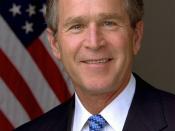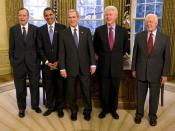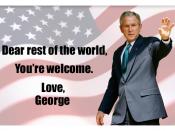George W. Bush"Speech to Congress After September 11 (2001)"12/12/2008Applying classical rhetorical methodology to a speech given by George W. Bush over the terrorist attack on September 11, 2001.
The President of the United States of America, George W. Bush, is by far one of the most influential and renowned world leaders of today. In spite of these characteristics, it is safe to say that the majority of people agree that Bush has affected the world more negatively than he has positively.
As of today, the war in Iraq is a consequence of Bush's actions. Even though his declarations of the superfluous war lead to the capture of the notorious Saddam Hussein, it is a product of the countless deaths and torture that occurs everyday of the civilians and soldiers.
Statistics prove that George Bush has caused a greater downfall in unemployment than Herbert Hoover. Bush is also the inspiration of an upcoming documentary, Fahrenheit 9/11, made by Michael Moore.
One of the most controversial and provocative films of the year, Fahrenheit 9/11 Moore's searing examination of the Bush administration's actions in the wake of the tragic events of 9/11. He looks at how - and why - Bush and his inner circle avoided pursuing the Saudi connection to 9/11, despite the fact that 15 of the 19 hijackers were Saudis and Saudi money had funded Al Qaeda.
George W. Bush, son of George Herbert Walker Bush and Barbra Pierce Bush, was born on July 6, 1946 in New Haven, Connecticut. In 1948 the Bush family moved to Texas (Bear, 1).
George W Bush attended Phillips Academy, a boarding school in Andover, Massachusetts. As a student he was known more for his charisma rather than his grades. Bush was a member of the basketball team and the cheerleading squad. Directly after...



Excellent
You obviously deserved that A+. Just by looking at your bibliography, I can see the extent of the research that you conducted. The essay is very detailed and you have a clear thesis that is backed up by many points. I especially like the background information that you gave on Bush; it really helps the reader have context to the essay.
2 out of 2 people found this comment useful.